Your approach to mistakes defines your success
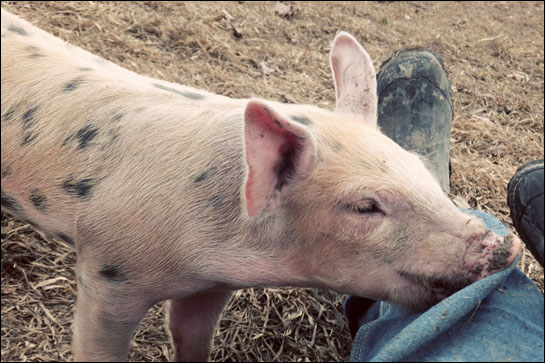
One of the first things I wondered about the Farmer when I met him is why he was even reading my blog.
He told me, “I’m an entrepreneur.”
I was hooked. I had no idea what he was talking about. But I could see that I was going to learn a lot from him, and nothing gets me going like a steep learning curve.
That was five years ago. Today, I read all the farming magazines that come to the house, I sit in on meetings with the seed salesman and the accountant who specializes in farms. The Farmer has a rule that I can listen but I have to wait until the end for questions, because people in the farm community are too nice to tell me when I’m asking too many. “But you are,” he tells me. “Just trust me that you are.”
The more knowledge I have about farming the more I scream about how he treats the animals. Family farms are generally horrendous for animals. Not because the farmers have no ethics but because ethics are contextual, and like every other profession, farmers just do what other farmers do. For example, corn is like crack to pigs. It’s not healthy for them but you can move pigs around by feeding them corn like you feed kids candy.
So I am not nearly as offended with the idea that pigs are fed candy as I am with the idea that pigs are confined. They have the IQ of a three-year-0ld kid. They should not be confined to a tiny space. And definitely farrowing crates are out-of-control inhumane.
I could go on and on but I also understand the economics of farming. If you don’t know 99% of pork in the US comes from a farrowing crate operation then you have no idea that you should be paying ten times the amount for the pork you eat. And maybe you wouldn’t. So the economics of farming is a mess, and someone needs to take some big risks.
This is where Matthew comes in. I’m going to call him Matthew now. Because he’s amazing and this is a post about how amazing he is and I don’t want him to be a character on my blog anymore.
Matthew is a one-man pork revolution with a Jewish wife who won’t let pork in the house. He is working on figuring out how to make it economical to produce pigs without farrowing crates. No crates means the mom might crush pigs, or the pigs might freeze. It means that Matthew has to reinvent raising pigs.
Matthew has been raising pigs since he was a young boy. And he went to graduate school for pig genetics. Even so, raising pigs more humanely is a huge risk for him. He can go online and read about how other people do it but each farm has different weather, different crops, different layouts. It’s impossible to simply copy another farmer’s solution. Also Matthew already gets the highest price in Wisconsin for his pork, but it’s not nearly enough to cover the drama of trying to raise pigs outside of farrowing crates.
He puts the mom pig on a pasture, like a free-range cow, and the mom builds a nest and has her pigs and takes care of them. Some days last summer he couldn’t find one of the moms. But the moms are completely capable of managing their piglets and raising them without farmer confinement.
This is a picture of a mom’s nest in the summer pasture. Everyone is warm and happy.
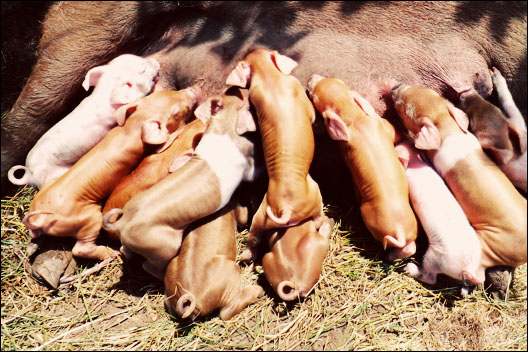
In the summer, that system works well, but Matthew needs to be able to continue supplying restaurants year-round. So he needs to have baby pigs in the spring and fall as well, which is when the pasture is too cold or too wet, so he has to have an alternative system.
He put the pigs into a fenced-off area where they could be in little huts. It worked well. The mom pigs stayed inside a quarter acre surrounded by an electric wire, and the baby pigs ran all over the place, but they always go back to their mom. Have you seen a picture of a farm where chickens run all over the place? We have chickens and piglets. People can’t believe it when they visit. A piglet approaches, like a puppy, to play.
Farmers see chaos and mayhem. I see revolutionary inventiveness. I kept telling Matthew that if people knew how much happier his pigs were than a regular pig, they would pay a premium. I tell him this is the future of pigs.
Things were going great until this spring. It was very very wet and very very cold.
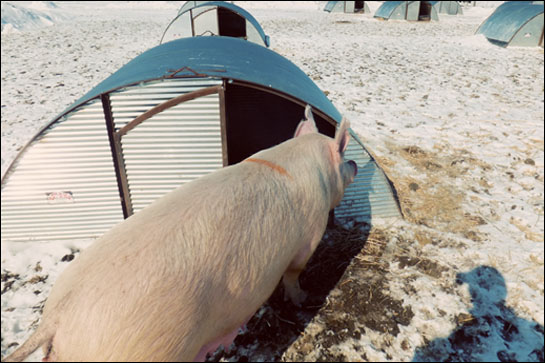
The moms were supposed to make nests in the huts. But there was not really a place for the moms to stay dry. This is a picture of the nest inside the hut: cold and muddy.
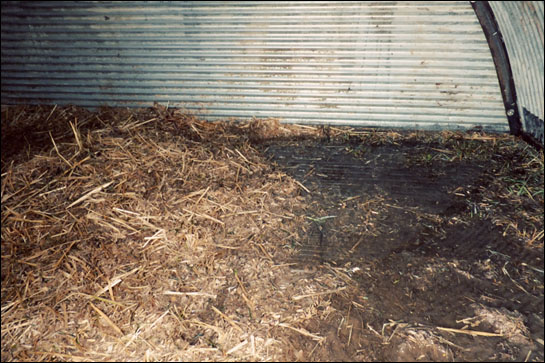
There are a million variables in farming. If the ground thaws and then freezes the moisture is more in the dirt than if it doesn’t freeze. Or something like that. Matthew knows everything about the weather. (Here is something he told me that I swear has been true every time: “Rain before 7, done by 11. Rain after 8, rain til late.”)
So this spring, the pig experiment didn’t work. The piglets were born on the cold, wet ground, and in one week, sixteen piglets died.
Matthew lined them up and took a picture.
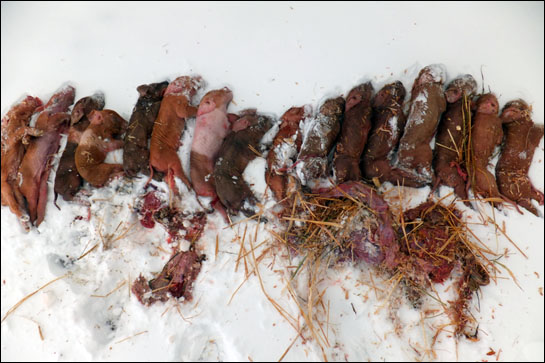
Like a Monday morning quarterback, he could see all the mistakes he made. He ended up buying bedding for the pigs that cost enough to make the pigs unprofitable for the whole season. He’s been caring for 100 pig litters a year for forty years. He never expected to make such a big mistake. He questioned everything: his IQ, his morals, his financial competence, he work ethic.
When things go bad for any business, it’s so easy to feel like a failure. But to have animals dying makes it all seem even worse. He told me he wanted to sell his farm.
I understand that feeling. It’s the feeling of wanting to give up when things go bad in your business. There are lots of ways to get past that moment. Each entrepreneur finds one that works for them.
1. Focus on the big idea.
My favorite is to focus on the big picture rather than the problem at hand.
I told him he’s a revolutionary. He must keep going. I told him he might have to kill hundreds of pigs and lose thousands of dollars, but someone needs to do that in order to lead the pork industry to a more humane way of economically raising pigs. Someone has to be a leader, and leaders lead by failing and trying again. I told him the happiest people have the hardest jobs.
My speeches do not inspire him. Revolutionaries seldom do that sort of thing in order to get attention as a leader. They do it because it is right, and they want to do what’s right. Revolutionaries are driven by something more important than ego.
So he told me to stop talking to him about it.
2. Take action.
Matthew personality type is ISTP. So he needs to focus on taking action as a way to get past a bad mistake.
He revised his system so that the next week of freezing rain didn’t kill any pigs. They were all dry and cozy.
And he is thinking about the next season of pigs, and the next set of problems. Like, I planted 20,000 bulbs last fall and the free-range piglets have dug up about 2000.
Matthew’s question is how to treat pigs more humanely and still have a profitable business. Every time he solves one problem, he gets another one. People talk a lot about what makes a successful entrepreneur, and the answer is that they don’t quit. Each time a huge problem arises, an entrepreneur has a choice to work on solving it, or stop trying.
3. Surround yourself with people making mistakes and surviving.
The reason entrepreneurs hang out with each other is because it’s inspiring to watch people work on problem after problem.
And of course, that is true for life, as well.
Our lives are defined by the problems we take on. Every day I look out our window and I feel so lucky to have the piglets running around. They are a wonder to watch, and they create more and more problems, and Matthew is a wonder to watch solving them.

Hogs have thin hair, and aren’t the most cold-tolerant animal. What about changing animals? Cattle can handle the cold really well, and are adept at giving birth out in the pasture, the woods, or a dry, warm and roomy stall. We raised both when I was growing up, and the hogs were very high-maintenance. We were constantly repairing their buildings and fencing they had ruined. Another reason for the staples in the nose–so they won’t dig out under the fence or stall. Good column, somewhat of a departure from your norm, but very interesting and well-written, as usual.
This post reminded me of this story http://en.wikipedia.org/wiki/To_Serve_Man_%28The_Twilight_Zone%29
I’m not trying to be snarky, it’s just the way my mind works.
I appreciated this post because I’ve never on a farm so it’s all new information to me.
Wow. Mathew is awesome. He is on the cusp of a major change to happen to the food industry, perhaps hard for now, but it’s the future. I will pay more for what I call ‘happy meat’ – food that has lived a good life before becoming food. Years ago, I requested organic pork from our grocer, who wouldn’t bring it in at the time because it was so expensive. He wouldn’t listen to me standing there saying ‘I don’t care what it costs compared to the cheapest – I want the best’. So in time, the issue won’t be ‘will people pay the price for happy meat?, It will be ‘how can people get access to this product’? And restaurants will print ‘farrow-free’ the way they print ‘wild, free-range, organic,’ etc.
I am giving up pork until I can buy from Matthew!
This post is going on my list of favorites!
I love how so many commentators immediately shift into creative problem-solving mode!
Interesting article about Matthew the pig farmer. As to paying a premium, I will pay a premium for leaner but tasty pork. If that happens to also be free range pork, great. I highly doubt that most Americans really care if you have determined that a particular technique is or is not “humane.”
Sadly, I think you are right in concluding that “most Americans” will not care . . . But Penelope’s post serves to raise our consciousness about humane animal husbandry. The dominoes will fall, and one day there WILL BE a critical mass which DOES care. It is a baby step. Oh, and Markie, don’t be cynical. Cynicism serves to dim or dash hope. IMHO.
Cynicism is a tool. As with any other tool, it has very specific applications. In a progress debate, it serves to energize the innovators to try harder.
Penelope, I thought of you the other day and was wondering how you were doing. (I check in with your blog every one or two years, and read a selection of the intervening posts on that visit.)
I was hoping you were still with the farmer, and still ‘sassy’ and opinionated. :-)
I stopped by tonight and this is the first post that I’ve read — it’s pretty nifty that it seems to be your first ever post where you have mentioned “the farmer” by his first name! Good stuff – I’m glad that your relationship is going well.
The last entry I read on my last visit was the one about where you went to take photos of the local kids dressed up for prom and you were wearing a sun hat and the other ladies thought you were sort of weird for doing so. (And you had a third, adult, unrelated woman living with you, sorta like one of those French movies which seem conventional for the first half and then get kinda soft-porny towards the end, ha ha ha.)
I expect I have a lot to catch up on (but I don’t expect it to get soft-porny.
….though I wouldn’t rule anything entirely out with you!) :-)
I must say that I think your blog redesign looks a bit bland. Too much white space. Not enough color. On first impression, it doesn’t highlight even a tad of your quirky personality. The main photo of you is kinda old now (I remember it from several years ago) – put up a new one!
I love that you used Matthew’s name in this post instead of ‘The Farmer’ :) And I hope he doesn’t give up! People will want to pay more for beef from happy cows, eggs from happy chickens, bacon from happy pigs etc. I know I would.
Kudos to you both. I would pay double for humanely raised, humanely slaughtered meat. I eat little meat now, but (for me) vegetarianism is not the answer. I hate it that the big fish eats the little fish, and I hate it that the cheetah eats the baby gazelle, but that’s how the world is. I wish that every litter of kittens could find wonderful homes, but that’s not ever going to happen. What CAN happen is massive spay/neuter to put a dent in the euthanasia at animal shelters. And on farms, what CAN happen is to give these beautiful creatures a happy life, even if it’s a short one. Keep going. Keep trying.
” I kept telling Matthew that if people knew how much happier his pigs were than a regular pig, they would pay a premium. I tell him this is the future of pigs.”
Penelope, this is the future of pigs. Gestation crates are illegal now throughout the entire EU. Big multinational companies like McDonalds are committing to phasing out gestation crates in their supply chain. Matthew should know that his attention to the welfare of pigs is a noble cause, but also a market only going in one direction – growth.
Leah Garces
USA Director
Compassion in World Farming
Great post Penelope.
Love the description of the farmer/entrepreneur/Matthew and that he’s found something that’s important to him AND is taking action.
Gold!
Cheers,
John
I hate the word ‘failure’ and mistakes is pretty close to it. My view is that life is about set-backs and we can all change course to continue to our goal.
Great post!